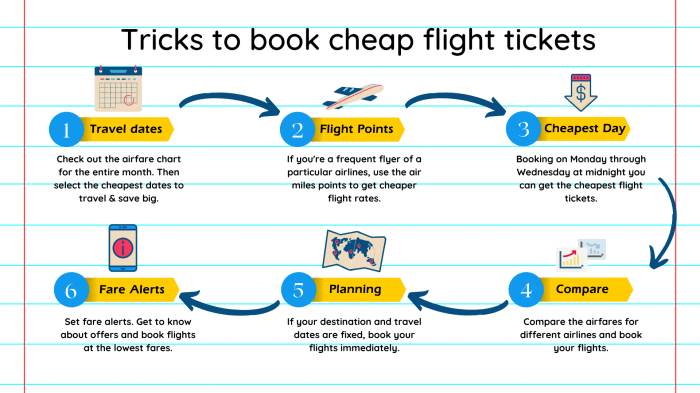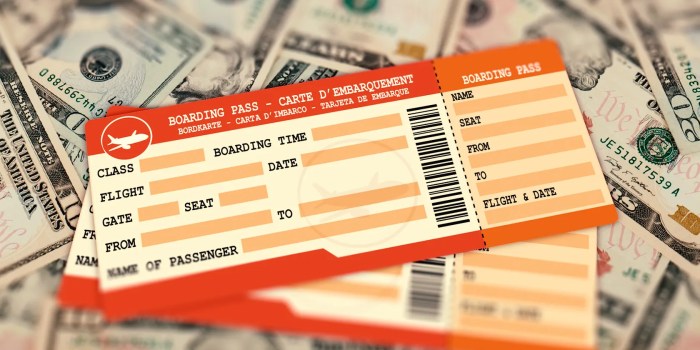Airline Ticket Hacks: Unlocking the secrets to unbelievably cheap flights isn’t about luck; it’s about strategy. This isn’t your grandma’s travel guide; we’re diving deep into the data-driven world of airfare, revealing the hidden tricks and techniques used by savvy travelers to snag the best deals. Prepare to transform your travel planning from frustrating to fantastic.
From mastering flight search engines and exploiting flexible date searches to leveraging frequent flyer programs and understanding airline policies, we’ll equip you with the knowledge to conquer the complexities of air travel and secure those coveted low fares. We’ll cover everything from budget airlines and smart packing strategies to navigating hidden fees and maximizing your points and miles. Get ready to take control of your travel budget and experience the world without breaking the bank.
Utilizing Points and Miles
Unlocking the potential of frequent flyer programs can dramatically reduce the cost of air travel, transforming your next vacation from a budget-busting endeavor into a financially savvy adventure. Mastering the art of accumulating and redeeming points and miles is a game-changer for the savvy traveler, allowing you to fly in comfort and style without breaking the bank. However, like any financial strategy, it’s crucial to understand both the advantages and disadvantages before diving in.
Advantages and Disadvantages of Frequent Flyer Programs
Frequent flyer programs offer compelling benefits, primarily the ability to earn free flights and upgrades. The accumulation of points through everyday spending, coupled with strategic partnerships, can lead to significant rewards. However, it’s important to acknowledge the potential drawbacks. Award availability can be unpredictable, and the value of a point can fluctuate depending on the redemption option.
Furthermore, program rules and restrictions can sometimes feel complex and frustrating. The time investment required to maximize your rewards should also be considered. Essentially, the system rewards dedicated and informed participation.
Earning and Redeeming Points and Miles for Airline Tickets
Earning points is surprisingly straightforward. Most programs offer points for flights booked directly with the airline, but many also partner with credit card companies, hotels, rental car agencies, and even online shopping portals. Every dollar spent with these partners can translate into valuable points. Redeeming points for airline tickets is generally a simple online process. You’ll typically browse available flights, select your desired itinerary, and then use your accumulated points to cover the cost, either partially or entirely.
The key is to book flights well in advance, as award availability diminishes closer to the travel date. Remember to check the terms and conditions of your chosen program, as fees and surcharges may apply.
Comparison of Frequent Flyer Programs and Their Reward Structures
Different airlines boast different reward structures. Some programs emphasize ease of earning points, while others focus on luxurious redemption options, such as first-class upgrades or access to exclusive airport lounges. For example, United MileagePlus might be attractive for its extensive network and diverse partnership options, while Delta SkyMiles could offer a more streamlined redemption process. Before committing to a single program, research various options and carefully compare their earning rates, redemption values, and partner offerings.
Consider your typical travel patterns and spending habits to determine which program best aligns with your needs.
Step-by-Step Guide on Transferring Points Between Different Programs
Transferring points between programs isn’t always straightforward, but it’s a powerful tool for maximizing your rewards. First, identify programs with transfer partnerships. Many major programs allow point transfers to partner programs. Next, log into your source program’s account and locate the point transfer option. You’ll typically need to provide the recipient program’s member number.
Then, specify the number of points you wish to transfer and confirm the transaction. Finally, keep a record of the transfer, including the date and amount. Remember, transfer fees and minimum transfer amounts may apply. This strategy is especially useful for maximizing the value of your points by leveraging transfer bonuses and taking advantage of advantageous redemption opportunities in different programs.
Understanding Airline Policies

Navigating the world of air travel requires more than just booking a flight; it demands a thorough understanding of airline policies. These policies, often complex and varied, directly impact your travel experience, from the type of ticket you purchase to how your luggage is handled in case of unforeseen circumstances. Ignoring these policies can lead to unexpected costs and significant inconveniences.
This section will demystify key aspects of airline policies, empowering you to travel more smoothly and confidently.
Types of Airline Tickets and Associated Restrictions
Airline tickets aren’t all created equal. Different fare classes, often denoted by letters (e.g., Economy, Premium Economy, Business, First), come with varying levels of flexibility and restrictions. Basic Economy tickets, for example, typically offer the lowest price but often restrict baggage allowance, seat selection, and the ability to change or cancel flights. Conversely, higher fare classes usually provide more flexibility and amenities.
Understanding these differences is crucial for making informed booking decisions aligned with your travel needs and budget. A full-fare Business class ticket will usually allow for significant changes and cancellations without penalty, while a deeply discounted Basic Economy ticket may be non-refundable and non-changeable.
Procedures for Handling Lost Luggage or Flight Delays
Lost luggage and flight delays are unfortunately common occurrences. Knowing the proper procedures to follow in such situations can significantly mitigate the stress and hassle involved. Immediately report lost luggage to the airline’s baggage service office at the airport. They will typically provide you with a claim tag and begin the process of tracking your bags. For flight delays, check the airline’s website or app for updates and contact customer service for rebooking options or compensation if applicable.
Many airlines offer assistance with hotel accommodations or meal vouchers in the event of significant delays. Documenting all interactions with airline staff, including claim numbers and communication records, is highly recommended.
Comparison of Baggage Policies Across Different Airlines
Airline baggage policies vary considerably. Some airlines offer generous free baggage allowances, while others charge significant fees for checked bags and even carry-ons. Budget airlines, in particular, often have stricter and more costly baggage policies. Before booking, carefully review the specific baggage allowance and fees for your chosen airline and flight. Consider the size and weight restrictions for both checked and carry-on luggage to avoid unexpected charges at the airport.
For example, Southwest Airlines is known for its relatively generous baggage allowance compared to Spirit Airlines, which charges heavily for both checked and carry-on bags. This difference can significantly impact the overall cost of your trip.
Passenger Rights and Protections, Airline Ticket Hacks
Understanding your rights as an air passenger is essential. Airlines are subject to various regulations and laws designed to protect passengers. These protections can vary depending on your location and the specific circumstances of your journey.
- Right to Compensation for Flight Delays or Cancellations: In many cases, passengers are entitled to compensation for significant flight delays or cancellations, particularly if the delay is within the airline’s control.
- Right to Refunds: If a flight is canceled or significantly delayed, you may be entitled to a full or partial refund for your ticket.
- Right to Assistance with Lost or Damaged Baggage: Airlines are responsible for compensating passengers for lost or damaged baggage up to a certain limit.
- Right to Fair Treatment: Passengers are entitled to respectful and courteous treatment from airline staff.
- Right to Accessibility: Airlines must provide reasonable accommodations for passengers with disabilities.
It is crucial to familiarize yourself with the specific passenger rights and protections applicable to your situation and jurisdiction. This knowledge will empower you to advocate for yourself and obtain the compensation or assistance you deserve.
Travel Insurance and Protection

Navigating the world of air travel, even with savvy points and miles strategies, involves inherent risks. Unexpected events, from lost luggage to medical emergencies, can quickly derail your meticulously planned trip and inflict significant financial burdens. This is where travel insurance steps in, offering a crucial safety net and peace of mind for your journey. Understanding the nuances of travel insurance is essential to making an informed decision that best protects your investment and well-being.Travel insurance isn’t just about covering potential medical expenses; it’s a comprehensive safeguard against a wide array of travel-related mishaps.
A well-chosen policy can provide financial protection against trip cancellations, lost or delayed baggage, flight disruptions, and even unforeseen medical emergencies abroad. The cost of a policy is often a small fraction of the overall trip cost, yet the potential return on investment in the event of an unforeseen circumstance can be substantial.
Types of Travel Insurance Plans and Coverage
Travel insurance plans vary considerably in their coverage and price points. Basic plans typically offer minimal coverage, focusing primarily on medical emergencies and trip cancellations due to specific, pre-defined reasons. Comprehensive plans, on the other hand, provide broader protection, encompassing a wider range of scenarios, including lost luggage, flight delays, and even emergency evacuation. Some policies even offer rental car insurance or coverage for activities like skiing or scuba diving.
Consider a policy’s specific inclusions and exclusions carefully. For instance, some policies may exclude pre-existing medical conditions, while others may offer limited coverage for adventure activities. Understanding these nuances is key to selecting a policy that meets your specific needs and risk tolerance.
Factors to Consider When Choosing Travel Insurance
Choosing the right travel insurance requires careful consideration of several key factors. First, assess the overall value of your trip, including flights, accommodation, and planned activities. This will help you determine the appropriate level of coverage. Next, evaluate your personal risk tolerance. Are you traveling to a region with a high risk of natural disasters or political instability?
Do you have any pre-existing medical conditions? These factors will influence the level of coverage you require. Finally, compare policies from different providers, paying close attention to the specific coverage details, exclusions, and the overall cost. Don’t hesitate to contact providers directly to clarify any uncertainties. Reading reviews from other travelers can also provide valuable insights into the reliability and responsiveness of different insurance companies.
Scenarios Where Travel Insurance Would Be Beneficial
Numerous scenarios highlight the value of travel insurance. Imagine a sudden illness requiring hospitalization in a foreign country; the medical costs could easily reach tens of thousands of dollars. Travel insurance can alleviate this financial burden. Consider a scenario involving a natural disaster forcing the cancellation of your flight and accommodation; a comprehensive policy can reimburse you for those non-refundable expenses.
Or perhaps your luggage is lost or delayed, leaving you stranded without essential items; travel insurance can help cover the cost of replacing those necessities. Even minor inconveniences like significant flight delays can be mitigated with travel insurance, providing compensation for missed connections or unexpected expenses incurred due to delays. In short, travel insurance acts as a buffer against the unexpected, protecting your financial investment and ensuring a smoother travel experience.
Alternative Transportation Methods: Airline Ticket Hacks
Flying isn’t always the best option. While convenient, air travel can be expensive and environmentally unfriendly. Smart travelers understand that exploring alternatives like trains and buses can significantly impact their travel budget and carbon footprint. This section will equip you with the knowledge to make informed decisions, choosing the most efficient and cost-effective transportation for your specific needs.
Consider the distance, your time constraints, and the overall cost when comparing flying to alternative methods. Sometimes, the seemingly slower option of a train or bus can save you money and offer a more scenic and relaxing journey. Factors such as baggage fees, airport transfers, and potential delays also play a significant role in the overall cost-benefit analysis.
Understanding these factors allows you to make a truly optimized travel plan.
Cost and Benefit Comparison: Flying vs. Ground Transportation
Direct comparison of air travel versus ground transportation (trains and buses) reveals that cost and time are inversely proportional. Generally, air travel is faster but significantly more expensive, particularly for shorter distances. Ground transportation, while slower, often provides a more affordable option, especially for longer trips where the time difference is less impactful. Furthermore, factors such as comfort level and environmental impact should also be considered.
Trains often provide a more comfortable experience than buses, and both are generally more environmentally friendly than airplanes.
Situations Favoring Alternative Transportation
Several scenarios clearly highlight the advantages of choosing ground transportation. For instance, traveling between major cities within a single country often presents a compelling case for trains or buses. The cost savings can be substantial, and the travel time may not be drastically longer, especially if you factor in airport transfers and security checks. Similarly, when traveling with a lot of luggage, the lack of baggage fees on trains and buses becomes a significant advantage.
For budget-conscious travelers or those prioritizing environmental responsibility, choosing trains or buses is often the smarter choice.
Transportation Comparison Websites and Apps
Numerous online resources help compare transportation options. Websites like Google Maps, Rome2rio, and Kayak provide comprehensive comparisons of flights, trains, and buses, displaying real-time pricing and schedules. These tools are invaluable for planning your journey and ensuring you select the most suitable mode of transport. Many of these apps also offer features such as price alerts and fare tracking, enabling you to find the best deals.
Sample Route: Travel Time and Cost Comparison
Let’s compare travel times and costs for a hypothetical route between New York City and Boston. This table illustrates the potential differences in various transportation methods.
| Transportation Method | Estimated Travel Time | Estimated Cost (One-Way) | Notes |
|---|---|---|---|
| Airplane | 1 hour | $100 – $300 | Excluding baggage fees and airport transfers |
| Train (Amtrak) | 3-4 hours | $50 – $150 | Prices vary depending on class and booking time. |
| Bus | 4-6 hours | $30 – $80 | Prices vary depending on the bus company and time of booking. |
Mastering the art of airline ticket hacks isn’t just about saving money; it’s about gaining control over your travel experience. By understanding the intricacies of flight pricing, loyalty programs, and booking strategies, you’ll transform from a passive traveler to a strategic planner. Remember, the key is to be flexible, informed, and proactive. Armed with these techniques, you can unlock incredible travel opportunities and make your dream vacations a reality without sacrificing your financial well-being.
So, start planning your next adventure – smarter, not harder.

